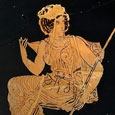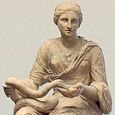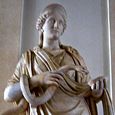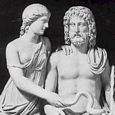HYGEIA
Greek Name
Ὑγεια
Transliteration
Hygeia
Roman Name
Salus
Translation
Good Health (hygiês)
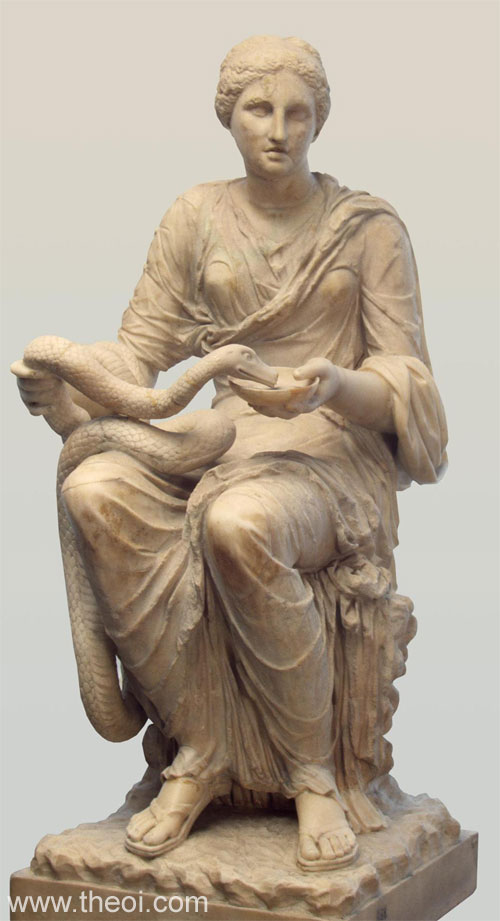
HYGEIA was the goddess of good health. She was a daughter and attendant of the medicine-god Asklepios (Asclepius), and a companion of the goddess Aphrodite. Her sisters included Panakeia (Panacea) (Cure-All) and Iaso (Remedy).
Hygeia's opposite number were the Nosoi (Spirits of Disease). Her Roman name was Salus.
In classical sculpture she was represented as a woman holding a large serpent in her arms.
FAMILY OF HYGEIA
PARENTS
[1.1] ASKLEPIOS & EPIONE (Greek Lyric V Anonymous Frag 939 Erythrae Inscription, Suidas s.v. Epione)
[1.2] ASKLEPIOS (Pausanias 1.23.5 &
5.20.2)
[2.1] EROS & PEITHO (Orphic Rhapsodies Frag)
ENCYCLOPEDIA
HYGIEIA (Hugieia), also called Hygea or Hygia, the goddess of health, and a daughter of Asclepius. (Paus. i. 23. § 5, 31. § 5.) In one of the Orphic hymns (66. 7) she is called the wife of Asclepius; and Proclus (ad Plat. Tim.) makes her a daughter of Eros and Peitho. She was usually worshipped in the same temples with her father, as at Argos, where the two divinities had a celebrated sanctuary (Paus. ii. 23. § 4, iii. 22.§ 9), at Athens (i. 23. § 5, 31, § 5), at Corinth (ii. 4. § 6), at Gortys (viii. 28. § 1), at Sicyon (ii. 11. § 6), at Oropus (i. 34. § 2). At Rome there was a statue of her in the temple of Concordia (Plin. H. N. xxxiv. 19). In works of art, of which a considerable number has come down to our time, she was represented as a virgin dressed in a long robe, with the expression of mildness and kindness, and either alone or grouped with her father and sisters, and either sitting or standing, and leaning on her father. Her ordinary attribute is a serpent, which she is feeding from a cup. Although she is originally the goddess of physical health, she is sometimes conceived as the giver or protectress of mental health, that is, she appears as mens sana, or huliea phrenôn (Aeschyl. Eum. 522), and was thus identified with Athena, surnamed Hygieia. (Paus. i. 23. § 5; comp. Lucian, pro Laps. 5.)
Source: Dictionary of Greek and Roman Biography and Mythology.
CLASSICAL LITERATURE QUOTES
HYGEIA GODDESS OF HEALTH
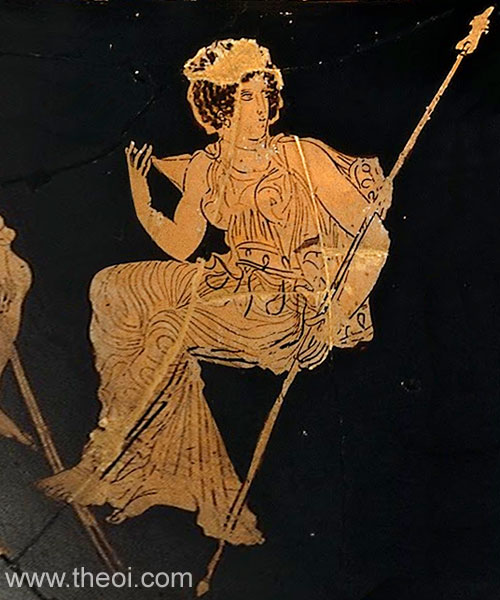
Hippocrates, The Hippocratic Oath (Greek physician C5th to C4th B.C.) :
"I swear by Apollon (Apollo) the physician, and Asklepios (Asclepius), and Hygeia, and Panakeia (Panacea),
and all the gods and goddesses, that, according to my ability and judgment, I will keep this Oath and this
stipulation . . ."
Greek Lyric V Anonymous, Fragment 939 (Inscription from Erythrai) (trans. Campbell)
(Greek lyric B.C.) :
"Asklepios (Asclepius), the most famous god--ie Paian! By him were fathered Makhaon (Machaon) and
Podaleirios (Podalirius) and Iaso (Healer)--ie Paian!--and fair-eyed Aigle (Aegle, Radiance) and
Panakea (Panacea, Cure-all), children of Epione, along with Hygieia (Hygeia, Health), all-glorious,
undefiled."
Licymnius, Fragment 769 (from Sextus Empiricus, Against the Ethicists) (trans.
Campbell, Vol. Greek Lyric V) (Greek lyric C4th B.C.) :
"Bright-eyed mother, highest queen of Apollon's golden throne, desirable, gently-laughing Hygeia
(Health)."
Ariphron, Fragment 813 (from Athenaeus, Scholars at Dinner) (trans. Campbell, Vol.
Greek Lyric V) :
"Hygeia (Health), most revered of the blessed ones among mortals, may I dwell with you for what is left of
my life, and may you graciously keep company with me : for any joy in wealth or in children or in a king's
godlike rule over men or in the desires which we hunt with the hidden nets of Aphrodite, any other delight or
respite from toils that has been revealed by the gods to men, with you, blessed Hygeia, it flourishes and shines
in the converse of the Kharites (Charites, Graces); and without you no man is happy."
Euenus, Fragment 6 (trans. Gerber, Vol. Greek Elegiac) (Greek elegy C5th B.C.) :
"Drinking [moderately] is beneficial for body, mind and property. It is well suited to the deeds of
Aphrodite and to sleep, a haven from toils, and to Hygeia (Health), most pleasing of the gods to mortals."
Aeschylus, Agamemnon 1001 ff (trans. Weir Smyth) (Greek tragedy C5th B.C.)
:
"Truly blooming health (hygeia) does not rest content within its due bounds; for disease
(nosos) ever presses close against it, its neighbor with a common wall. So human fortune, when holding
onward in straight course strikes upon a hidden reef."
[N.B. Health and Disease are constrasted in this passage, although not strongly personified.]
Orphic Hymn 68 to Hygeia (trans. Taylor) (Greek hymns C3rd B.C. to 2nd A.D.)
:
"To Hygeia (Health), Fumigation from Manna. O much desired, prolific, general queen. Hear me, life-bearing
Hygeia, of beauteous mien, mother of all; by thee diseases dire, of bliss destructive, from our life retire; and
every house is flourishing and fair, if with rejoicing aspect thou art there. Each daidal art they vigorous
force inspires, and all the world thy helping hand desires. Aides (Haides), life's bane, alone resists thy will,
and ever hates thy all-preserving skill. O fertile queen, from thee for ever flows to mortal life from agony
repose; and men without thy all-sustaining ease find nothing useful, nothing formed to please. Without thy aid,
not Aides' self can thrive, nor man to much afflicted age arrive; for thou alone, of countenance serene, dost
govern all things, universal queen. Assist thy mystics with propitious mind, and far avert disease of every
kind."
Orphic Hymn 67 to Asclepius :
"[Asklepios (Asclepius)] husband of blameless Hygeia (Health)."
Apuleius, The Golden Ass 10. 25 ff (trans. Walsh) (Roman novel C2nd A.D.) :
"He [the corrupt physician] made a pretence of dispending the celebrated potion called by more learned
people ‘The Health Offering’ (Salus Sacra), a drug necessary for easing gastric pains and
dissolving bile; but in its place he substituted another draught, ‘The Death Offering’
(Proserpina Sacra) [i.e. poison]."
[N.B. Salus is the Roman name for Hygeia. Prosperina is Persephone, the goddess of death.]
Suidas s.v. Epione (trans. Suda On Line) (Byzantine Greek Lexicon C10th A.D.)
:
"Epione: wife of Asklepios (Asclepius), and daughters named Hygeia, Aigle (Aegle), Iaso, Akeso (Aceso),
Panakeia (Panacea)."
CULT OF HYGEIA
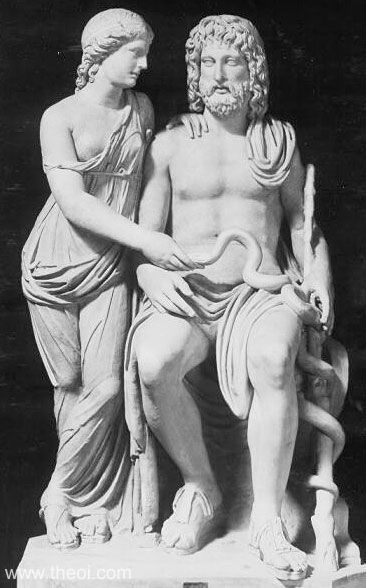
I. ATHENS Main City of Attica (Attika) (Southern Greece)
Pausanias, Description of Greece 1. 23. 5 (trans. Jones) (Greek travelogue C2nd A.D.)
:
"[On the Akropolis (Acropolis), Athens] are figures of gods; of Hygeia (Health), whom legend calls daughter
of Asklepios (Asclepius), and of Athena, also surnamed Hygeia."
II. OROPUS (OROPOS) Village in Attica
Pausanias, Description of Greece 1. 34. 3 :
"[The temple of Amphiaraus (Aphiaraus) in Oropos (Oropus), Attika L] The altar shows parts . . . The fourth
portion of the altar is to Aphrodite and Panakeia (All-Curing), and further to Iaso (Healer), Hygeia (Health)
and Athena Paionia (Paeonia, Healer)."
III. MEGARA Main Town of Megaris (Southern Greece)
Pausanias, Description of Greece 1. 40. 6 :
"When you have ascended the citadel [at Megara] . . . you see . . . The image of Asklepios (Asclepius) and
also that of Hygeia were made by Bryaxis."
IV. CORINTH (KORINTHOS) Main City of Corinthia (Southern Greece)
Pausanias, Description of Greece 2. 4. 5 :
"By this gymnasium [in Korinthos] are temples of Zeus and Asklepios (Asclepius). The images of Asklepios
and Hygeia are of white marble."
V. TITANE Village in Sicyonia (Sikyonia) (Southern Greece)
Pausanias, Description of Greece 2. 11. 6 :
"[In the santuary of Asklepios (Asclepius) at Titane, Sikyonia :] Of the image [of Alexanor, granson of
Akslepios] can be seen only the face, hands, and feet, for it has about it a tunic of white wool and a cloak.
There is a similar image of Hygeia (Health); this, too, one cannot see easily because it is so surrounded with
the locks of women, who cut them off and offer them to the goddess, and with strips of Babylonian raiment. With
whichever of these a votary here is willing to propitiate heaven, the same instructions have been given to him,
to worship this image which they are pleased to call Hygeia."
VI. ARGOS Main City of Argolis (Southern Greece)
Pausanias, Description of Greece 2. 23. 4 :
"The most famous sanctuary of Asklepios (Asclepius) at Argos contains at the present day a white-marble
image of the god seated, and by his side stands Hygeia."
VII. EPIDAURUS (EPIDAUROS) Town in Argolis
Pausanias, Description of Greece 2. 27. 6 :
"[In the sanctuary of Asklepios (Asclepius) at Epidauros, Argolis there is] a temple to Hygeia, Asklepios,
and Apollon, the last two surnamed Aigyptios (Egyptian)."
VIII. OLYMPIA Village & Sanctuary in Elis (Southern Greece)
Pausanias, Description of Greece 5. 20. 2 - 3 :
"[Depicted on table made by Kolotes (Colotes) at Olympia, Elis :] On one side are Asklepios (Asclepius) and
Hygeia (Health), one of his daughters."
Pausanias, Description of Greece 5. 26. 2- 3 :
"Along the left side of the great temple [at Olympia, Elis] Mikythos (Micythus) dedicated other offerings :
[statues of] . . . deities, Asklepios (Asclepius) and Hygeia."
IX. AEGIUM (AIGION) Town in Achaea (Akhaia) (Southern Greece)
Pausanias, Description of Greece 7. 23. 7 :
"[There is at Aigion (Aegion), Akhaia] precinct of Asklepios (Asclepius), with images of him and
Hygeia."
X. MEGALOPOLIS Main City of Arcadia (Arkadia) (Southern Greece)
Pausanias, Description of Greece 8. 31. 1 :
"[At Megalopolis, Arkadia] is an enclosure sacred to the Great Goddesses (Megalai Theai) [Demeter
and Persephone] . . . Carved in relief before the entrance are, on one side Artemis, on the other Asklepios
(Asclepius) and Hygiea."
Pausanias, Description of Greece 8. 32. 4 :
"[At Megalopolis, Arkadia] there is a sanctuary of Asklepios (Asclepius), with images of the god and of
Hygeia."
XI. GORTYS Village in Arcadia
Pausanias, Description of Greece 8. 28. 1 :
"Here [Gortys, Arkadia] is a temple of Asklepios (Asclepius), made of Pentelic marble, with the god, as a
beardless youth, and an image of Hygeia. Skopas (Scopas) was the artist."
XII. TEGEA Town in Arcadia
Pausanias, Description of Greece 8. 46. 1 :
"On one side of the image of Athene (Athena) [at Tegea, Arkadia] stands Asklepios (Asclepius), on the other
Hygeia, works of Skopas (Scopas) of Paros in Petelic marble."
XIII. THESPIAE (THESPIAI) Town in Boeotia (Boiotia) (Central Greece)
Pausanias, Description of Greece 9. 26. 8 :
"[At Thespia, Boiotia there is an] image of Tykhe (Tyche), and in another place that of Hygeia."
ANCIENT GREEK & ROMAN ART
SOURCES
GREEK
- Hippocrates, The Hippocratic Oath - Greek Rhetoric C5th - 4th B.C.
- Greek Lyric V Licymnius, Fragments - Greek Lyric C4th B.C.
- Greek Lyric V Ariphron, Fragments - Greek Lyric B.C.
- Greek Lyric V Anonymous, Fragments - Greek Lyric B.C.
- Greek Elegaic Euenus, Fragments - Greek Elegaic C5th B.C.
- Aeschylus, Agamemnon - Greek Tragedy C5th B.C.
- Pausanias, Description of Greece - Greek Travelogue C2nd A.D.
- The Orphic Hymns - Greek Hymns C3rd B.C. - C2nd A.D.
ROMAN
- Apuleius, The Golden Ass - Latin Novel C2nd A.D.
BYZANTINE
- Suidas, The Suda - Byzantine Greek Lexicon C10th A.D.
OTHER SOURCES
Other references not currently quoted here: Pliny Natural History 39.19.
BIBLIOGRAPHY
A complete bibliography of the translations quoted on this page.
